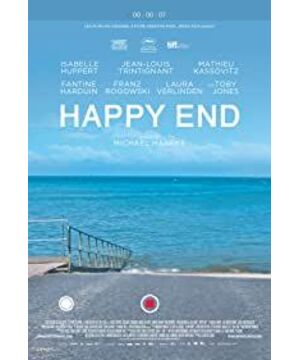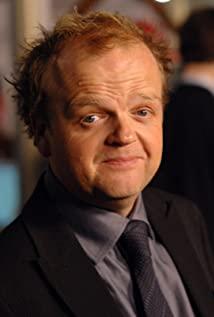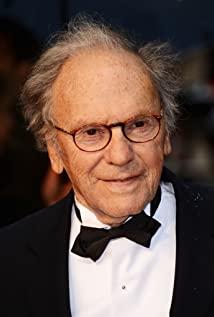Movie fans who have seen Michael Haneke's (hereinafter referred to as "Haneke") films know that his films are full of direct or perspective, or even stare, ruthless views of human beings. In my impression, Haneke is a director who has never made a comedy, and naturally it is difficult to see a sense of humor in his films.
In Haneke's latest, "Happy Endings," we seem to see a little bit of his sense of humor, and he's playing with new media—but in a soft and trendy way, his lens is still aimed at the indifferent humans.
The two "live broadcasts" at the beginning of the film seem boring, but they make people smile. After smiling, we will also find that the indifferent new human being, the 13-year-old girl Eve, has quietly entered our field of vision. And her perspective will also become an important testimony of this loveless family.
"Happy Ending" is a typical group drama, a large bourgeois family constitutes a group portrait of "indifferent humans":
The old man who took a back seat only wanted to die. After his request for euthanasia was rejected, he made a farce after another.
The old man's daughter runs the family's construction company and is a "strong woman", but she has raised a son who cannot be supported by mud.
After an engineering accident, her son knew that he had no hope of taking over, so he fell into self-destruction and made various troubles in family affairs.
The old man's son is the director of surgery at a well-known hospital. He is divorced and has a daughter with his ex-wife.
His remarried wife was beautiful and docile, just after giving birth to a son, and he had an affair with a violinist.
His ex-wife was hospitalized in a coma due to heavy doses of antidepressants, and he had to take his 13-year-old daughter Eve back into the extended family.
Eve is a big kid. She peeked at her father's computer and grasped the fact of his cheating. She also suffered from paranoia of abandonment, and finally even took medicine to commit suicide. Fortunately, she was rescued in time.
...
There are many characters in the film, the narrative is interlaced in multiple lines, and there is a lot of blank space. If the audience is not careful, they will miss some details, which will affect the overall understanding of the film.
Haneke adopts a fragmented narrative strategy, but each fragment can find a corresponding module in the context. Looking at it carefully, it is not difficult for the audience to collage events and characters, and finally spell out the family tree of the family.
All the pieces can be put together, but after putting together a complete picture, we find that our hearts are numb, just as a 13-year-old girl said to her father, I see it, you don't love anyone.
Surgeons have no love in their hearts.
His wife has no love at home.
Businesswomen have no love in their hearts.
Her son lacked love and love in his heart, and so was the sensitive little girl.
Seeing the last three years of his wife's dementia and bedridden, the old man only wanted to find his "self" in death, and love was taken away when his wife died.
The old man in "Happy Ending" is also the male lead in Haneke's previous film "Love" (2012).
In "Love", he could not bear his wife's dignified life and suffocated her.
In the conversation with his granddaughter, the old man mentioned this "past" - in fact, the old man in "Happy Ending" and the hero in "Love" (he chose suicide after suffocating his wife) were not The same person, the director just uses this to establish a kind of continuation relationship with "Love". In addition, Huppert is the only daughter of the old couple in "Love", and in "Happy Ending" her "father" is still the old man.
Different from the heaviness and despair of "Love", the "pursuit" of the old man in "Happy Ending" has a certain joking flavor-does this mean that Haneke's attitude towards "euthanasia" has become more free and easy already? And dying with dignity may be the most appropriate self-determination for indifferent humans.
After reading Buñuel's "The Discreet Charm of the Bourgeoisie", I once believed that the bourgeoisie does have this magical "charm". But after watching "Happy Ending" and changing my perspective, I suddenly discovered that the bourgeoisie has never had any prudent charm, and everyone's heart is a glacier, constantly collapsing in the face of climate change.
" O
View more about Happy End reviews











